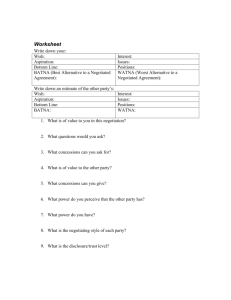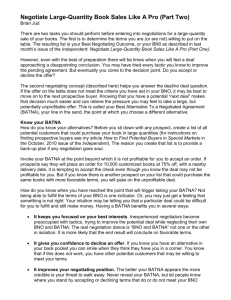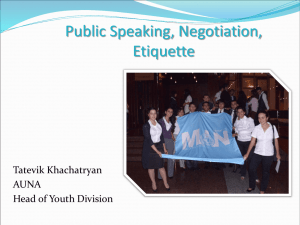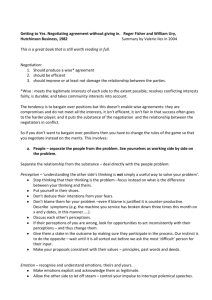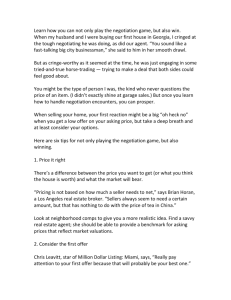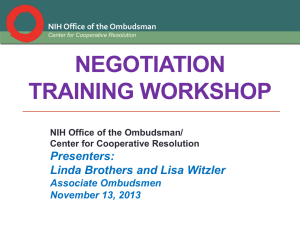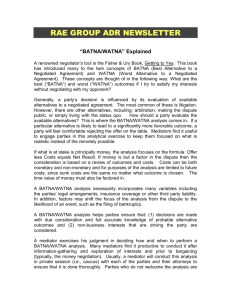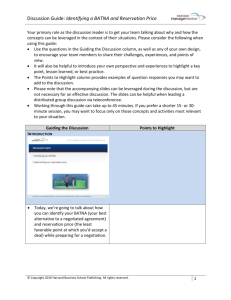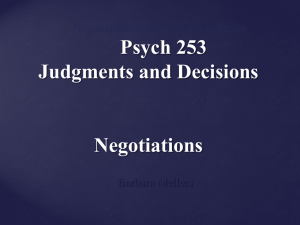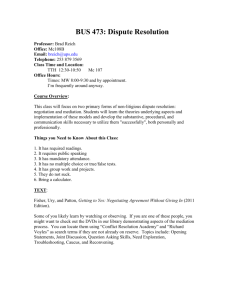Don`t Leave Money on the Table
advertisement
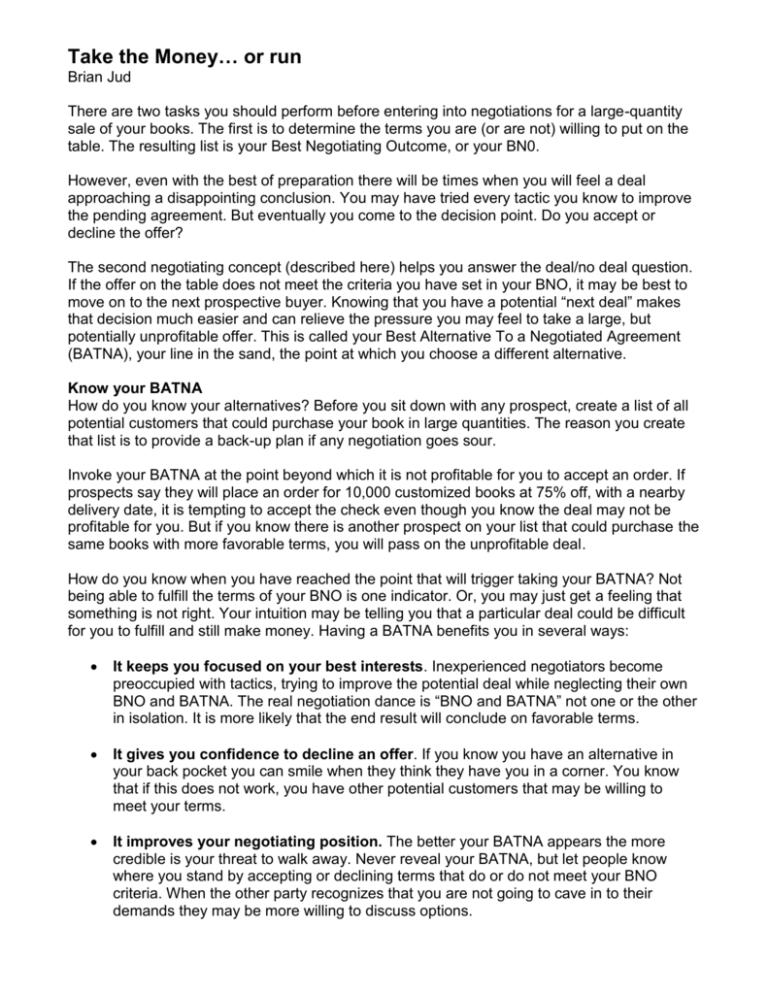
Take the Money… or run Brian Jud There are two tasks you should perform before entering into negotiations for a large-quantity sale of your books. The first is to determine the terms you are (or are not) willing to put on the table. The resulting list is your Best Negotiating Outcome, or your BN0. However, even with the best of preparation there will be times when you will feel a deal approaching a disappointing conclusion. You may have tried every tactic you know to improve the pending agreement. But eventually you come to the decision point. Do you accept or decline the offer? The second negotiating concept (described here) helps you answer the deal/no deal question. If the offer on the table does not meet the criteria you have set in your BNO, it may be best to move on to the next prospective buyer. Knowing that you have a potential “next deal” makes that decision much easier and can relieve the pressure you may feel to take a large, but potentially unprofitable offer. This is called your Best Alternative To a Negotiated Agreement (BATNA), your line in the sand, the point at which you choose a different alternative. Know your BATNA How do you know your alternatives? Before you sit down with any prospect, create a list of all potential customers that could purchase your book in large quantities. The reason you create that list is to provide a back-up plan if any negotiation goes sour. Invoke your BATNA at the point beyond which it is not profitable for you to accept an order. If prospects say they will place an order for 10,000 customized books at 75% off, with a nearby delivery date, it is tempting to accept the check even though you know the deal may not be profitable for you. But if you know there is another prospect on your list that could purchase the same books with more favorable terms, you will pass on the unprofitable deal. How do you know when you have reached the point that will trigger taking your BATNA? Not being able to fulfill the terms of your BNO is one indicator. Or, you may just get a feeling that something is not right. Your intuition may be telling you that a particular deal could be difficult for you to fulfill and still make money. Having a BATNA benefits you in several ways: It keeps you focused on your best interests. Inexperienced negotiators become preoccupied with tactics, trying to improve the potential deal while neglecting their own BNO and BATNA. The real negotiation dance is “BNO and BATNA” not one or the other in isolation. It is more likely that the end result will conclude on favorable terms. It gives you confidence to decline an offer. If you know you have an alternative in your back pocket you can smile when they think they have you in a corner. You know that if this does not work, you have other potential customers that may be willing to meet your terms. It improves your negotiating position. The better your BATNA appears the more credible is your threat to walk away. Never reveal your BATNA, but let people know where you stand by accepting or declining terms that do or do not meet your BNO criteria. When the other party recognizes that you are not going to cave in to their demands they may be more willing to discuss options. It sets the threshold that an acceptable agreement must exceed. Once you decline an offer, you have drawn your line of demarcation beyond which you will not cross. It defines a zone of possible agreement. As you participate in the negotiation process, both parties begin to understand each other’s upper and lower limits. The zone is established by each party’s BNO on the upper level and each party’s BATNA at the other extreme. Now you can both work within that framework. However, do not be too quick to invoke it. If you sense you are sliding away from a mutually profitable solution, look first for ways to check the spiral. Retain your composure and search for solutions. Your prospects may be testing you to see how far they push before you balk. Attempting to back out when there is still hope for a negotiated solution can cause irreparable loss of negotiating position. Know your prospect’s BATNA Both parties in the negotiation have a BATNA, and your prospects will not become customers until your offer beats their no-deal option. A necessary condition for an equitable agreement is when both parties do better than their BATNA. Your prospects have at least three possible courses of action other than accepting your proposal. 1. Do it later or do not do it at all. When they use this as the reason for not accepting your proposal it is usually a negotiating or delaying tactic. They invited you to discuss the terms of purchasing your books because they saw the potential revenue opportunity in your initial proposal. 2. Implement the plan with a competitive company. Be familiar enough with your competition so you can describe how your book is uniquely positioned to meet their campaign objectives. 3. Do it themselves. Your prospects may think they can create the necessary content in house. This is possible with large corporations in highly specialized fields such as pharmaceutical companies. Reiterate your author’s exceptional credentials on the topic. If necessary, go on to describe how firms that contract with an external provider are 12% more likely to succeed in a new venture than those firms relying on internal development1 Remind them that the addition of a full-time employee (FTE) increases fixed costs and makes an exit strategy more expensive. Hiring one person to write the book could cost $100,000 (including benefits) with recurring annual employee expense and no guarantee of success. Should you take the money, or run? Ask that question of yourself before signing on the dotted line. After you sign, it’s too late to change any part of the agreement. Know when it is best for you to commit to an offer, or go to the next deal. ----------Brian Jud is the Executive Director of SPAN. He is also the author of How to Make Real Money Selling Books. Brian offers commission-based sales of books to buyers in non-bookstore markets. Contact Brian at P. O. Box 715, Avon, CT 060010715; (860) 675-1344; brianjud@bookmarketing.com or www.premiumbookcompany.com twitter.com/bookmarketing 1 “Finding the Right Path,” Harvard Business Review, July-August, 2010, page 104
